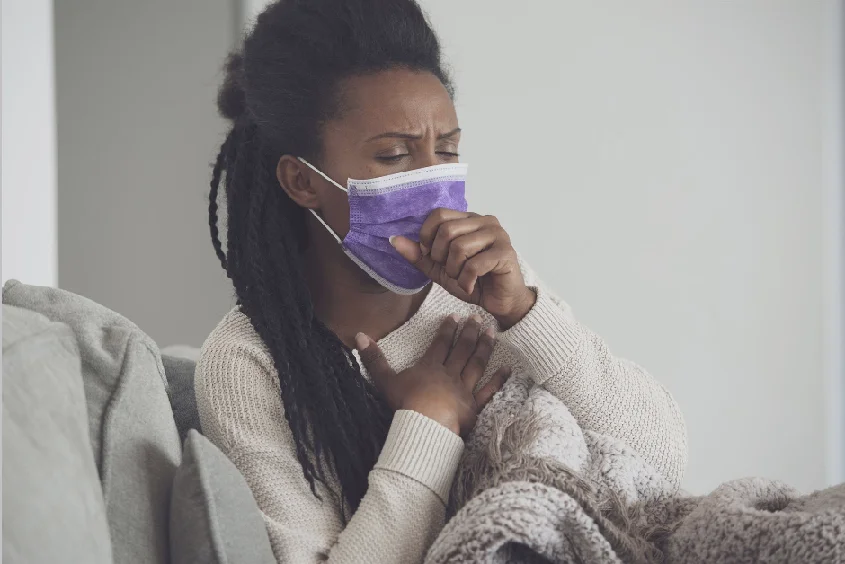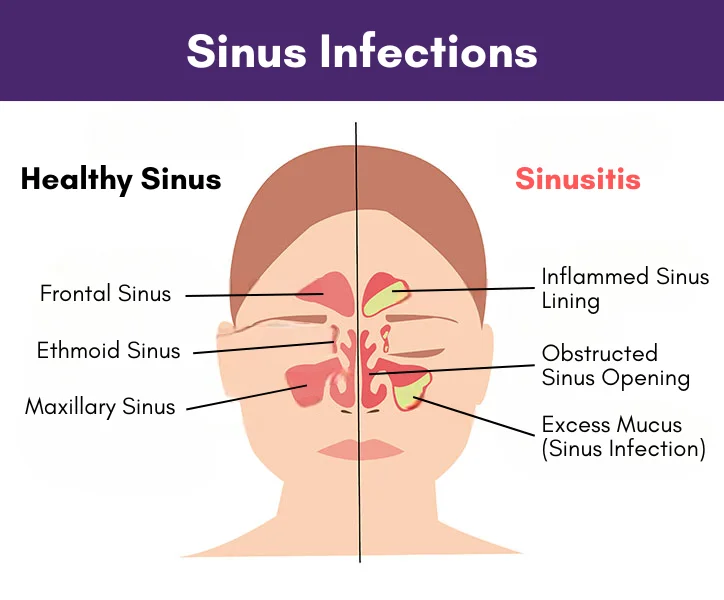DiseaseFix’s every article is examined by board-certified medical professionals to ensure that details on conditions, symptoms, treatments, and protocols comply with current guidelines and recent research. Our content is also written, verified, and approved by a team of experienced writers, editors, clinicians, and other experts.
The Spread of Sinus Infections: How It Happens and Why It Matters
- Updated on: Aug 1, 2024
- 6 min Read

Sinus infections, also known as sinusitis, are a common health concern affecting millions of people worldwide each year. In fact, according to the American Academy of Allergy, Asthma, and Immunology, sinusitis affects approximately 30 million adults in the United States alone.
Sinus infections occur when the sinuses become inflamed and swollen due to a variety of factors, including viruses, bacteria, and environmental irritants. Common symptoms of sinus infections include facial pain, nasal congestion, headaches, and fatigue. In severe cases, sinus infections can lead to complications such as meningitis and brain abscesses.
Common symptoms of sinus infections
The symptoms of sinus infections can vary depending on the severity and duration of the infection, as well as the underlying cause. Some of the most common symptoms include:
- Facial pain or pressure
- Congestion or a stuffy nose
- Headache
- Loss of smell or taste
- Thick yellow or green nasal discharge
- Sore throat
- Coughing
- Fatigue
- In some cases, sinus infections can also cause fever or dental pain.
Causes of sinus infections
Sinus infections are typically caused by a bacterial or viral infection. The most common viruses that cause sinus infections are the same viruses that cause the common cold. Bacteria that can cause sinus infections include Streptococcus pneumoniae, Haemophilus influenzae, and Moraxella catarrhalis.
Other factors that can increase the risk of developing a sinus infection include allergies, nasal polyps, a deviated septum, or exposure to irritants such as cigarette smoke or pollution. People with weakened immune systems or who have recently had a cold or the flu may also be more susceptible to sinus infections.
According to the Centers for Disease Control and Prevention (CDC), sinus infections affect an estimated 29.4 million adults in the United States each year. In fact, sinus infections are one of the most common reasons why people visit their doctor or seek medical care. By understanding the causes and symptoms of sinus infections, people can take steps to prevent and treat this common health condition.
The importance of understanding how sinus infections spread
Understanding how sinus infections spread is critical for preventing their transmission and reducing their impact on public health. Sinus infections are typically spread through the exchange of respiratory fluids, such as mucus and saliva, between individuals. This can occur through direct contact with an infected person, such as shaking hands or kissing, or through contact with contaminated objects, such as doorknobs or shared utensils.
According to a study published in the Journal of Clinical Microbiology, up to 70% of sinus infections are caused by viruses, with the remaining cases caused by bacteria or other factors. The study also found that sinus infections are more common during the winter months when people are more likely to spend time indoors and in close proximity to one another.
How Sinus Infections Spread

Sinus infections, also known as sinusitis, can be caused by bacteria, viruses, or fungi. The most common cause of sinus infections is viruses, accounting for up to 90% of all cases. However, bacterial infections are also common, particularly in cases that last longer than 10 days or worsen after initial improvement.
The Role of Bacteria and Viruses in Sinus Infections
Bacteria and viruses cause sinus infections by invading the sinus tissues and causing inflammation. Inflammation can lead to a buildup of mucus, which can block the sinuses and cause pain and pressure in the face and head. Bacterial infections can be particularly dangerous as they can spread to other parts of the body and cause severe complications, such as meningitis or brain abscess.
According to the Centers for Disease Control and Prevention (CDC), the most common bacteria that cause sinus infections include Streptococcus pneumoniae, Haemophilus influenzae, and Moraxella catarrhalis. Meanwhile, the most common viruses that cause sinus infections include rhinoviruses, influenza viruses, and coronaviruses.
Modes of Transmission
Sinus infections can spread through a variety of modes of transmission. The most common mode of transmission is through direct contact with an infected person’s respiratory secretions, such as when they cough or sneeze. These respiratory droplets can land on surfaces, such as doorknobs or countertops, and can survive for several hours or even days.
In addition to direct contact, sinus infections can also spread through indirect contact. For example, a person can become infected by touching a contaminated surface and then touching their nose or mouth.
Factors that Increase the Risk of Spreading Sinus Infections
Several factors can increase the risk of spreading sinus infections. These include:
- Being in close contact with someone who has a sinus infection
- Having a weakened immune system, such as from chronic illness or medications
- Exposure to environmental pollutants, such as cigarette smoke or air pollution
- Allergies or chronic rhinitis
- Structural abnormalities in the nose or sinuses, such as a deviated septum or nasal polyps
According to the American Academy of Otolaryngology-Head and Neck Surgery, up to 35 million people in the United States develop sinusitis each year. Of these cases, around 20% are bacterial infections, and the remaining 80% are viral or fungal. Overall, sinus infections are more common in adults than in children, and women are more likely than men to develop sinus infections.
The Importance of Preventing the Spread of Sinus Infections
Why preventing the spread of sinus infections is critical
Preventing the spread of sinus infections is critical for several reasons. Firstly, sinus infections are highly contagious and can spread quickly from person to person through contact with respiratory secretions such as mucus or saliva. According to the Centers for Disease Control and Prevention (CDC), millions of people are affected by sinus infections each year in the United States alone. This high rate of infection can result in a strain on healthcare resources, with an estimated 20% of all antibiotic prescriptions being for sinus infections.
In addition to the burden on healthcare resources, sinus infections can also have a significant impact on an individual’s quality of life. Symptoms such as facial pain, congestion, and headaches can interfere with daily activities, including work and social interactions.
The potential complications of sinus infections
If left untreated or if the infection spreads to other areas of the body, sinus infections can lead to serious complications. One of the most common complications of sinus infections is the development of secondary bacterial infections, such as pneumonia or meningitis. In rare cases, untreated sinus infections can also result in the development of brain abscesses or blood clots.
In addition to these potentially life-threatening complications, sinus infections can also worsen underlying medical conditions such as asthma or chronic obstructive pulmonary disease (COPD).
Strategies for preventing the spread of sinus infections
Preventing the spread of sinus infections involves a combination of personal and community-based strategies. These include:
- Practice good hygiene: Washing hands frequently, covering the nose and mouth when coughing or sneezing, and avoiding close contact with others who are sick can all help to prevent the spread of sinus infections.
- Stay home when sick: If you are experiencing symptoms of a sinus infection, it is important to stay home to prevent spreading the infection to others.
- Get vaccinated: Vaccines such as the influenza vaccine can help to prevent the development of sinus infections and other respiratory infections.
- Use antibiotics judiciously: Antibiotics are not always necessary for the treatment of sinus infections and overuse can contribute to antibiotic resistance.
- Manage underlying medical conditions: Proper management of conditions such as allergies or asthma can help to prevent the development of sinus infections.
Treatment Options for Sinus Infections
Over-the-counter Remedies
Over-the-counter (OTC) remedies are widely available and can help ease the symptoms of sinus infections. OTC options include decongestants, antihistamines, and pain relievers. Decongestants work by shrinking swollen nasal passages and reducing mucus production, while antihistamines help to reduce inflammation and relieve congestion. Pain relievers can help to ease headaches and facial pain associated with sinus infections.
It’s worth noting that while OTC remedies can be effective in relieving symptoms, they may not be sufficient for more severe or chronic sinus infections. In addition, some OTC remedies can have side effects, such as drowsiness, dry mouth, or increased blood pressure. It’s important to follow the recommended dosages and consult a healthcare professional if symptoms persist or worsen.
Prescription Medications
Prescription medications are typically recommended for more severe or chronic sinus infections. Antibiotics are often prescribed for bacterial sinus infections, while corticosteroids can be used to reduce inflammation and swelling. Nasal saline sprays and irrigation may also be recommended to help clear mucus from the sinuses.
It’s important to note that overuse of antibiotics can lead to antibiotic resistance, so they should only be used as directed by a healthcare professional. In addition, corticosteroids can have side effects such as weight gain, high blood pressure, and increased risk of infection. As with any medication, it’s important to discuss potential risks and benefits with a healthcare professional.
Home Remedies
Home remedies can be used in conjunction with other treatment options to help relieve symptoms of sinus infections. These remedies include:
- Steam inhalation: Inhaling steam from a hot shower or bowl of hot water can help to relieve congestion and loosen mucus.
- Warm compresses: Placing a warm, damp cloth over the face can help to relieve pain and pressure associated with sinus infections.
- Hydration: Drinking plenty of fluids can help to thin mucus and prevent dehydration.
- Rest: Getting plenty of rest can help the body to fight off infections.
While home remedies can be helpful, they may not be sufficient for more severe or chronic sinus infections. It’s important to consult a healthcare professional if symptoms persist or worsen.












